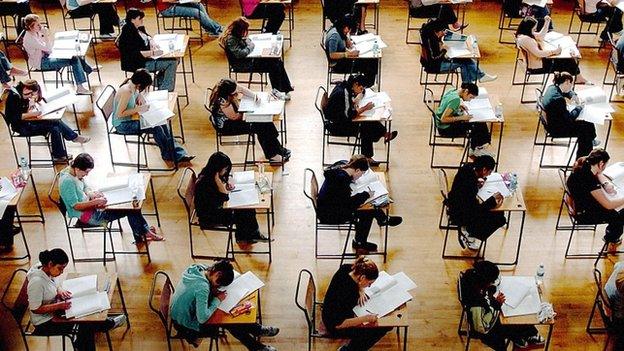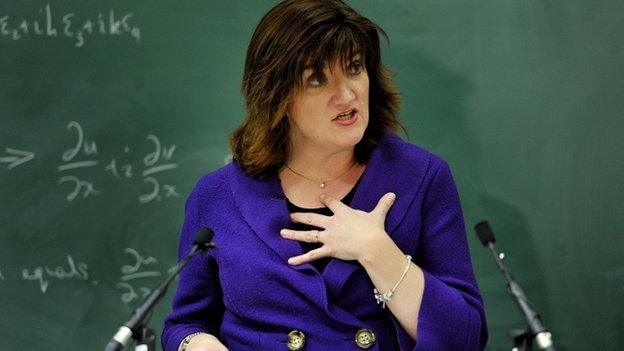Final decision on whether borough will have no A-levels
- Published

Parents have campaigned against plans to end the last A-levels in the borough
Academy governors will meet this week for a final decision on closing a sixth form, which would mean an entire borough would have no schools with A-level places.
Halewood Academy in Knowsley says its sixth form is not financially viable and has announced it should be shut.
But its closure would mark the end of the last A-level places in the borough.
Parents at the school who are protesting say: "This is letting down the children of this community."
On Wednesday, school principal Gary Evans said that parents would be told of the outcome as soon as the decision is reached this week.
'Who is accountable?'
Last month the governors at Halewood Academy announced that the sixth form should be closed because of funding cuts which made it financially unsustainable to continue with a sixth form for about 80 students.
Since this was the last remaining school in the borough offering A-levels, it would mean the entire A-level provision in Knowsley, in Merseyside, would cease, and pupils would have to seek places in schools in other authorities.

Nicky Morgan has announced plans for all schools to be academies
The local authority said that since this was an academy, it could not intervene in the decision.
A consultation on the proposed closure ended at the weekend - and there will now be a final decision.
Mr Evans says that the academy has been "working hard with Knowsley Council to ensure that individual pupils are catered for as a result of the decision to close the sixth form in August 2017".
Knowsley already has among the lowest university entry rates in England - and parents have warned about how this could block the ambitions of their children.
"This is letting down the children of this community. There are people who want to go to university, lots of kids who want to do well," says Vanessa Pointon, a parent at the school.
Sir Peter Lampl, chairman of the Sutton Trust which campaigns for social mobility, said: "It is important that young people have the opportunity to access a good choice of A-levels wherever they live."
Despite funding challenges, it was "crucial" that "such choices aren't curtailed", said Sir Peter.
It has also raised questions about how local provision will be protected if all schools are autonomous academies or academy chains.
"Who is accountable? Nobody knows. Who do we get in touch with?" says Ms Pointon, who is part of a parents' campaign to save the sixth form.
A spokeswoman for Knowsley council said: "Whilst we, as the local authority, do work with all our local academies to help them improve education standards, as an academy the school is ultimately accountable to the regional school commissioner, and not the local council."
The Department for Education says schools minister Nick Gibb is to meet local MPs and that if the school goes ahead with the closure it will still have to be scrutinised by education officials.
"It must make the case to the Education Funding Agency and the regional schools commissioner that post-16 provision in the area would not be adversely affected by the closure before it can be given permission to close it," said an education department spokesman.
The education select committee, which earlier this year published a report about the lack of clarity surrounding the role of regional schools commissioners, replied on Wednesday to the government's response.
Neil Carmichael, committee chairman said: "Regional schools commissioners play a powerful role in our educational system, but their work is not widely understood.
"Whilst the committee welcomes the government's moves to improve the accountability of regional schools commissioners, there is still a long way to go, particularly in terms of transparency and oversight."
- Published20 April 2016